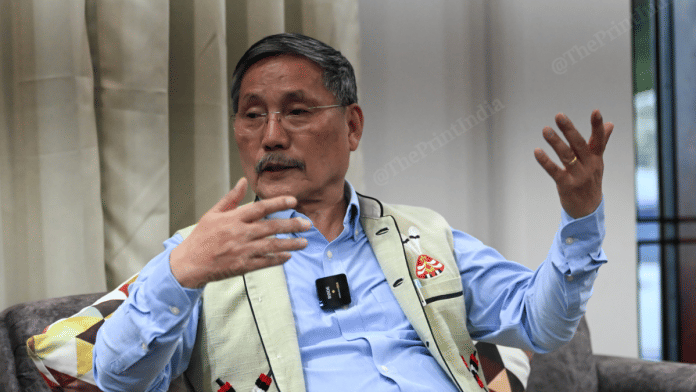Senapati, Manipur: The sooner the Indian government settles the Naga political problem the better because at the rate the peace talks have dragged on, many many Nagas would run out out of patience, senior National Socialist Council of Nagaland (Isak Muivah faction) leader V.S.Atem told ThePrint in an exclusive interview.
Atem, who is deputy of NSCN (IM) general secretary Thuingaleng Muivah, has come to Manipur’s Senapati district to attend the public civic reception being given to Muivah. The latter visited his ancestral Somdal village in Ukhrul district on 22 October after over 50 years and then came to Senapati, another Naga inhabited district, Wednesday to attend the civic reception.
The peace talks, according to Muivah’s deputy, will get derailed if it is delayed like this. “….It is not (because of) NSCN. We have been waiting for 10 years. Just imagine. It has been 28 years since the ceasefire was signed. But GoI has not realised the implications of all this,” he said Tuesday.
The NSCN (IM) has been involved in peace talks with the Government of India (GoI) for more than two decades now. The two sides had signed the Framework Agreement in August 2015 to end the oldest insurgency in the country.
It has been 10 years since then but the peace talks have not made much headway. At the centre of the discord is the NSCN (IM)’s demand for creation of Greater Nagalim or Nagaland, which proposes extending Nagaland’s border to include Naga-dominated areas in Assam, Manipur and Arunachal Pradesh and a separate flag and Constitution for them.
The Centre has refused to agree to these demands.
“Whether GoI refuses to accept or they agree to accept, it does not matter to us. We have the right. GoI has recognised the uniqueness of Naga history, meaning Nagas have not joined the Indian Union…. We have the legal right and our position is clear… We did not initiate the violence. GoI has forced upon the Nagas all this violence,” Atem said.
Muivah’s deputy added that peace can be made when the two would put out their hand to shake with each other. ”Only one hand will not shake…unilaterally, it (NSCN(IM)) cannot make peace. If India wants to live in peace with the Nagas, then Nagas are ready.”
‘Autonomy on BTC lines not acceptable’
Atem said that from the formation of Naga National Council till 1955, Nagas did not raise even their fingers against the Indian government. “We were trying our best to settle the issue amicably, to negotiate. We went to Delhi again and again. On one occasion, the leader Mr (Angami Zapu) Phizo was himself jailed in Kolkata. Many Nagas have been insulted, humiliated by the Government of India. Still then our leaders told the people to maintain restraint.”
But Muivah’s deputy was categorical that administrative, political and financial autonomy under the Sixth Schedule on the lines of Bodo Territorial Council is not acceptable to them. “Because, politically Nagas are independent,” he added.
At Ukhrul, Muivah’s address, which was delivered on his behalf by Atem, had threatened to resume armed struggle if the Centre did not adhere to the letter and spirit of the Amsterdam Joint Communique and the Framework Agreement 2015, which officially recognise the ‘Nagalim’s sovereignty’, the ‘Naga national flag’ and the ‘Naga national constitution’.
Asked about (resuming armed struggle) and if it would be acceptable to the Nagas, especially the youths today, Atem said that militarily, from a strength point of view and from materials point of view, Nagas are no comparison to India.
“But just look back to the 1940s, 1950s. Nagas, a majority of them, were almost naked, we were totally in darkness. Still in the 1960s Nehru was in a hurry to make peace with the Nagas. But he could not do it. After his demise, a ceasefire came between the GoI and the federal government of Nagaland. And at the Prime Minister’s level, talks were held. Six rounds of talks took place… GoI may be very strong, it may be very big but it also has its own limitations. Nagas are weak, Nagas are small but Nagas will not just bow down.”
Difference among Naga political & civil society groups
The NSCN leader also alleged that the Indian government has been working tirelessly to keep the Nagas divided.
“And yes, they (GoI) have won over quite a good number of these groups. Even one person can form a faction. Still the GoI will give recognition and they will be funded. So that is it. GoI may be able to buy off many people but not all,” Atem said in the interview.
Asked about the general sense of frustration among the Nagas over the extortion and tax collection being carried out by insurgent groups, Atem said, “Tax collection cannot be termed as extortion. GoI must accept that they have created tens of factions and they want these factions to indulge in extortion. So that our movement gets discredited.”
(Edited by Tony Rai)






